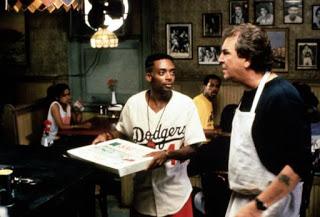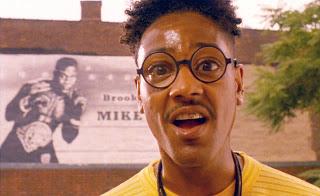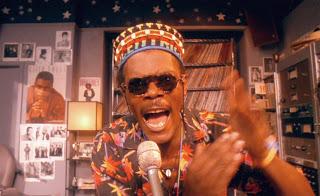
"Fuck you, fuck your fuckin' pizza, and fuck Frank Sinatra!"
Throughout the '90s, Spike Lee became American cinema's greatest provocateur. His raucous, confrontational style shook a Hollywood which considered Driving Miss Daisy an edgy racial drama. Do the Right Thing (1989) remains his best work, a remarkable mini-epic that explodes the rules for social dramas.Bedford-Stuyvesant marks the intersection of New York's racial tensions. Sal (Danny Aiello) owns a pizzeria and considers the neighborhood his home, to the chagrin of his racist son Pino (John Turturro). Mookie (Spike Lee) is Sal's delivery boy, Tina (Rosie Perez) Mookie's annoyed girlfriend. On a sweltering summer day, Buggin' Out (Giancarlo Espositio) complains that Sal doesn't have black celebrities on his wall of fame. This and other incidents snowball into a violent confrontation.
From its opening with Tina dancing to Public Enemy, Do the Right Thing confronts its viewers. Lee assaults us with crane shots, stylized angles (Radio Raheem looming over everyone), inserts of photos, newspapers, billboards highlighting discord. He pauses for Brechtian digressions: characters spouting ethnic slurs, DJ Mr. Senior Love Daddy (Samuel L. Jackson) listing musicians, police and blacks exchanging glares, Radio Raheem (Bill Nunn) reciting a monolog from Night of the Hunter. Bill Lee's score mixes with hip-hop and reggae, with "Fight the Power" becoming a leitmotif of chaos.

"I'm just a struggling black man, trying to keep my dick hard in a cruel and harsh world."
Do the Right Thing (1989) can't be easily summarized. Lee juggles dozens of characters with remarkable ease: Mookie argues with Tina and tries befriending Sal's son Pino. Sal laments that he can't move to a better neighborhood while Buggin' Out rails against white interlopers like Charlie (Frank Vincent) and Clifton (John Savage). Drunk Da Mayor (Ossie Davis) tries keeping the peace while romancing Mother Sister (Ruby Dee), neighborhood matriarch. Puerto Rican teens and Asian shopkeepers feed the resentment, creating a dramatic richness precluding easy answers.Lee attacks classic message movies where reason overcomes misunderstandings. Reason doesn't apply to Bed-Stuy, where personalities, ingrained tensions and summer heat build to violence. Blacks debate why Asian immigrants succeed instead of them; kindly Sal's more sympathetic than confrontational Buggin' Out. Da Mayor lectures younger blacks about irresponsibility, but he's dismissed as a drunk. Pino spouts slurs but loves black celebrities. Even Mookie neglects Tina and their daughter while taking "two hour lunch breaks." Conflicts cut across personal, racial and generational lines.
Once things reach a breaking it point, it's more twisted. Buggin' Out and Radio Raheem provoke Sal into an explosion, triggering a murder and riot. Da Mayor tries calming the crowd but his Stanley Kramer speech achieves nothing. Viewers didn't know how to respond: Sal's initially in the right, but events escalates far beyond a simple argument. Violence isn't justified but inevitable, leaving us to ponder whether destruction of property or murder is a greater evil.

"Are we gonna live together? Together are we gonna live?"
Danny Aiello earned an Oscar nod, making Sal a friendly man pushed too far. Spike Lee gives a nicely unaffected performance, providing a sane anchor. Ossie Davis and Ruby Dee have affecting supporting roles; Giancarlo Esposito's obnoxious provides a strong counterpoint. Samuel L. Jackson's flamboyant DJ nearly steals the show; Lee's sister, Joie Lee, plays Mookie's sister. Rosie Perez, Martin Lawrence and John Turturro shine in breakout performances.Robin Harris, Paul Benjamin and Frankie Faison play three onlookers who provide a sardonic commentary to events. Robert Guenveur Smith plays Smiley, a stammering vagrant who sells pictures of Martin Luther King and Malcolm X. Unlike most characters, he's too overtly symbolic to work. John Savage, Frank Vincent and Miguel Sandoval handle minor roles.
Do the Right Thing's tensions remain viable, from unrest in Baltimore to Eric Garner sharing Radio Raheem's fate. Whatever Spike Lee's shortcomings, he captures racism better than our typical white guilt dramas. The ending juxtaposes quotes from King and Malcolm X, showing that our ideal of racial harmony isn't realistic.

